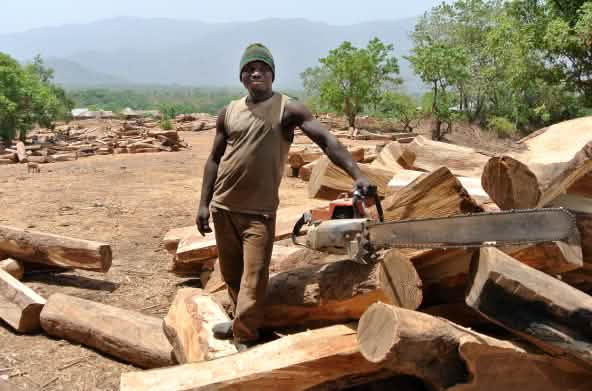Completed campaign
Berlin: Vattenfall to import tropical timber for use in biomass-fired power plants
In accordance with the Senate of Berlin, Germany, power company Vattenfall has announced plans to increase the production of energy from biomass – by employing tropical rubber wood as source material. Despite earlier schemes, biomass is needed in much larger amounts than the plants' local surroundings can provide. In order to meet the high demands, Liberia's rubber plantations are supposed to fill in – at the expense of the country's local residents as well as its rainforest stand.
Energy company Vattenfall plans to burn biomass for both production of heat and electric energy in six power plants in German capital Berlin. Berlin's Governing Mayor concluded this in an "Agreement on Climate Protection" with state owned Swedish power company, signed in October 2009.
According to a project presentation published by Vattenfall end of May 2010 the company's needs of woody biomass for Berlin amount to 1.3 million tons per year. But in contrast to earlier claims by the company, the region of Berlin and the surrounding federal state of Brandenburg are unable to meet this enormous quantity of biomass. At least 700,000 tons are to be imported from abroad every year. With already 30 biomass plants in different countries Vattenfall is in it's own words "one of the world’s biggest purchasers and users of biomass fuel". That's why Vattenfall puts out feelers globally and turns to Africa.
In the years to come, one million tons of rubber tree wood will be shipped from West African Liberia to Berlin. Dutch company Buchanan Renewable (BR) cuts - and claims to replant - the rubber trees in Liberia, and transport them to the coastal region for export. To this end, Vattenfall has also acquired a 20 percent share in BR, together with another 10 percent share owned by Swedish development agency Swedfund.
Vattenfall says the project will help farmers in Liberia to renew old unproductive rubber trees, and to generate income. But being asked, the version of the peasants is slightly different. The farmers complain about intransparent negotiations, unfavorable and changing contract conditions, low or including lack of payments, abandonment of the new trees, long term land rights acquired by the company, etc.
It is no surprise that for BR it is labor-intensive and ineffective to harvest the needed huge quantities of timber on small plots of land and little groups of a few rubber trees. That's possibly the reason why in the past months BR focused to clear cut large scale industrial rubber tree plantations, namely those of Japanese-US-American tire company Bridgestone-Firestone. But the labor conditions on the large rubber tree estate are catastrophic and the reason why local NGO SAMFU Foundation published it's report "Firestone: The Mark of Modern Slavery" already in 2005. Unfortunately also on all other Liberian rubber tree plantations the situation is much the same. This revelas the UN report "Human Rights in Liberia’s Rubber Plantations: Tapping into the Future" from 2006, which denounces, among other, "frequently used child labour" and that "the rule of law is undermined by illegal detentions and arrests by private security officers".
Just so that Vattenfall and the City of Berlin may embellish on the paper their reduction rates of carbon dioxide emissions, more pressure is put on the rainforest. Once the rubber plantations emerged on the expanse of the natural rainforest and their inhabitants.
But still in Liberia every year about 200,000 hectares of rainforests are cut by the timber industry, and for production of firewood and charcoal. About 95 percent of the households in Liberia use timber and charcoal for cooking and other energy needs. According to a survey the annual consumption of firewood in rural Montserrado County surrounding Liberias capital Monrovia is estimated at 18m3 per household.
Rubberwood is frequently used to make charcoal and traded on local markets. It is tacitly accepted by Vattenfall that the people of Liberia have to go on living with much less amounts of firewood – and with much higher firewood and charcoal prices. In the meantime a "Concession and Power Purchase Agreement" signed between the Liberian government and BR for the construction of an 34 megawatt power plant based on rubberwood for electricity generation has been on ice since January 2009. So far electricity in Liberia depends mainly on thousands of privately owned ineffective and harmful energy generators. But for BR it seems to be much more lucrative to sell the timber abroad than to use it for local energy production as most local people cannot afford monthly electricity bills in one of the poorest countries in the world.
Silas Siakor, director of the Sustainable Development Institute at the Liberian capital of Monrovia, is sure that these are the inevitable consequences of Vattenfall's rubber deal which Liberia has to face. Ever since the first protest campaign and statements by Rainforest Rescue, the Swedish power company has responded three times in writing. However, the impact on the people in Liberia and environment, the encouragement of rubber cultivation, the prospect of an ever increasing market demand for timber and biomass – all these issues were only very vaguely touched on by the Swedish power company. And with long transport distances within Liberia and the 5,500 kilometer shipment from Africa to Berlin it is very hard to believe of any climate benefits of the project.
Basically and essentially, Rainforest Rescue rejects Vattenfall's construction plans for giant biomass-fired power plants. German energy needs should not be fulfilled on the expanse of the people in Liberia and their environment. Please support the local non-governmental organizations in Liberia and take part in our protest campaign! More information about Vattenfall's biomass plans could be find
The planned massive Klingenberg cogeneration plant in Berlin's borough of Lichtenberg (two biomass-fired plants with an electric capacity of 20 megawatts each and generate a total of about 150 megawatts in district heating) and the district heating station located at Märkisches Viertel on the borough of Reinickendorf (thermal capacity of 18 megawatts, electrical generation capacity of 5 megawatts) are both fully wood-powered. At the four coal powered energy plants Klingenberg, Reuter West, Reuter C and Moabit, wood will be cofired as an extra energy source. Constructing these biomass-fired power plants for Vattenfall calls for high investments, and the break-even point can only be accomplished by means of long retention periods. In other words, this dangerous development will have to remain established for a long time. If the power plants get built, they'll have to be operated at any cost – no matter where the timber eventually comes from. To be frank: This is not about one region in Africa being troubled – this is about a global problem! At large, generating energy from wood is considered to be causing severe problems and as being overall confined to certain limits. The Global Forest Coalition (GFC) has published the survey „Wood-based bioenergy: the green lie“ on this subject-matter. The Liberian Ministry of Lands, Mines & Energy writes in its „Renewable energy and energy efficiency policy and action plan“ regarding the use of biomass for energy needs on page 3-4: "In Liberia, as in nearly all of Sub-Sahara African countries, woody biomass is the primary energy source used for domestic cooking and heating. Rural inhabitants and the poor account for a large proportion of firewood and charcoal use in the country.(...) There are no firm data on firewood consumption in Liberia, but findings from a survey conducted by CSET in 2004 indicate that scarcity of firewood is becoming a serious problem in most parts of Liberia, especially in Montserrado County. Nationally, Liberia is harvesting well above the level that can be sustained annually without depleting the current stock and degrading the environment. Annual consumption of firewood in rural Montserrado County is estimated at 18m3 per household. Forecast for the country estimates an annual increase in demand of about 0.6m3 per household. The impacts of firewood shortages in Liberia need to be researched extensively so as to formulate policy that would protect future generations. Without such policy, demand and consumption for charcoal and firewood will continue to grow in the absence of electricity and energy efficiency measures. The use of woody biomass as a source of energy will increase in relation to rural population growth and poverty. If this demand is not met in a sustainable manner, it will eventually lead to deforestation, environmental degradation and probably desertification in Liberia. Besides the issue of natural forest depletion, the production and consumption of woody biomass is inefficient. Hence, there is need to improve on the efficiency of production and consumption of woody biomass."
To the Senate of Berlin
The Governing Mayor
Mr. Klaus Wowereit
Vattenfall Europe
Mr. Tuomo Hatakka, Senior Executive Vice President
tuomo.hatakka@vattenfall.com , info@vattenfall.de
Dear Mr. Wowereit, dear Mr. Hatakka,
I reject the plans for the incineration of tropical timber at power plants in the Berlin area. Vattenfall states that one million tons of timber are needed on an annual basis to work the announced biomass-fired plants and to establish wood as an additional energy source at power stations already in use (Reuter West and Moabit). This large amount of wood can neither be supplied by local produce, nor can it be provided in an environment-friendly and socially acceptable way.
Vattenfall has acquired a share in the Dutch company Buchanan Renewable Energy (BRE) and has concluded a contract concerning the import of one million tons of rubber tree wood from Liberia. The affected rubber plantations have emerged as a result of the constant destruction of the local rainforest. According to experts, Liberia's stock in timber is too low to allow for any export business. Furthermore, wood charcoal made from rubber trees is used for cooking by the Liberian population. Business deals and export trades carried through by BRE already lead to severe consequences on the economy of Liberian cities whose inhabitants' lives rely heavily on wood charcoal: The prices have doubled since.
This situation puts the Liberian rainforest under an even bigger pressure. The state of affairs on rubber plantations is generally catastrophic – e.g. child labour is quite common. For Liberia, the United Nations even certified working conditions reminiscent of slavery, lawlessness and corruption and strong cases of environmental pollution. (1)
All the while, the construction works on a Monrovia-based electrical generating station with a future capacity of 36 megawatts are stuck for about a year. Buchanan Renewable (BR), another branch in the Dutch company, was officially instructed by the government to improve the disastrous power supply in Monravia. Originally, the Monrovian plant was to be powered with the woodchips BR produces from rubber trees as an energy source. But as of now, BR could well calculate it more profitable to sell their woodchips to Vattenfall instead of using them to provide Liberia's capital with electricity. Liberia is one of the poorest countries in the world.
What is more, the long route of transport – the wooden material is sent from the Liberian inland to the coastal region in order to be shipped to Berlin, a distance that amounts to 5.500 kilometres – demands large quantities of fuel and crucially harms the climate as well as the ecology.
It is wholly unacceptable that Vattenfall and the Senate of Berlin start only now to look into criteria as to how the necessary biomass can be produced sustainably – and if it can be done at all. Above all, the question remains if criteria regarding sustainability may be applied to countries like Liberia. Many important issues – such as indirect change in land use, i.e. displacement of established activities, and the effects on food prices – still refuse to be regulated and/or resolved.
For these reasons, I'm asking you to stop the construction of biomass-fired power plants in and around Berlin immediately – including any plans concerning the import of timber and other biological materials for energetic utilisation.
Yours sincerely,
Footnote:
(1) http://unmil.org/documents/human_rights_liberiarubber.pdf

